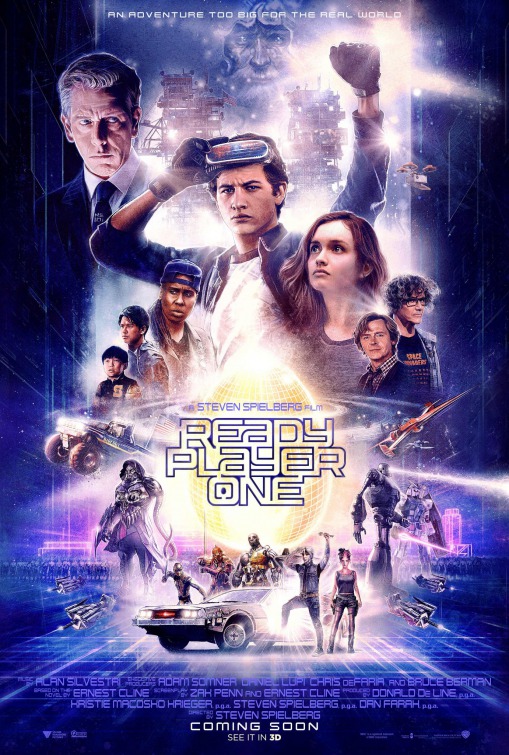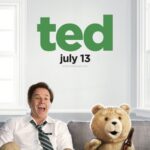An Adventure Too Big For The Real World
Director
Steven Spielberg
Starring
Tye Sheridan
Olivia Cooke
Ben Mendelsohn
In the year 2045, humanity has faced several crises but rather than treating them head on, most have retreated into a virtual video game environment called the Oasis. One such user is Wade Watts/Parzival [Sheridan] who is a “gunter,” a player who takes part in a quest for keys hidden throughout the programme which lead to an Easter egg placed by the Oasis’ late co-creator, James Halliday [Mark Rylance], granting the recipient sole control of the VR world and a sizeable fortune. Wade is assisted by a cadre of friends and allies, despite confessing that “he doesn’t clan up” with others. Acting as opposition is Nolan Sorrento [Mendelsohn], head of the unscrupulous conglomerate IOI who is seeking control of the Oasis in order to further his own nefarious ends and unwrite a lot of the parameters set by Halliday to ensure the product remains safe, fun and ad-free (for any current gamer, this part will really resonate). As Wade gets closer to ultimate success, the stakes are raised and his actions in the virtual world have lasting fallout in the real one.
Before going any further, I have not read the source material but one of the reasons this film ultimately succeeds is due to salvaging the barebones of the book’s story and injecting it with more cinematically pleasing challenges and ditching a lot of the 80s-heavy nostalgia that acts more as an exclusionary club than an inviting story. At the end of the day, that’s where I couldn’t get on with the book, it branded itself as a haven and celebration of pop culture but with the overbearing tone of “never forget that I know more than you;” so basically every film/comic/merch convention I’ve ever attended. But in a world where people carry phones and portable consoles around with them while investing in motion control or VR accessories for consoles, this feels like an interesting reflection on our desire to escape the real world and enter a fantasy of our own construction.
In a world where you can be anything you want, it makes complete sense to have a diverse cast of ethnicities. But the characters they portray are unfortunately quite flat. Through Aech we have a really nice story about the simple innocence of gender identity without beating you over the head with it but at the same time, the supports never really do much in the real world; leaving them as little more than accessories for Wade’s quest. Equally frustrating is that as much as we have the opportunity to challenge conventions of what a hero or a romance can look like, we still end up with a bland, predictable resolution of the pretty white boy ending up with pretty white girl and I’m going to go ahead and say that the port-stain birthmark is this film’s girl with glasses and a ponytail. Yet as vanilla as the characters eventually become, I have to commend the actors for bringing them to life to the best of their abilities. The romance may be painful but Cooke does a fantastic job as the passionate but semi-closed off Samantha/Art3mis and Sheridan elevates Wade/Parzival from a thoroughly obnoxious individual to a socially shaky but fundamentally passionate person.
If anything, this film is a bisected piece. On the one hand, it’s a visual spectacle, a feast for the eyes and senses offering an inviting world of bright escapism through references, trivia and nostalgia. In addition to all this, an overriding message is presented about both celebrating your hobbies and passions but ensuring you don’t compromise your real world existence in the process. The visuals are also pretty spectacular, in the few moments when everything is still and during the close-ups we are offered a look into the detailing process which is extremely well-crafted and being a fictional realm, the audience can suspend its disbelief so things like photorealism and the uncanny valley go largely out of the window because the environment everything takes place in, is essentially a video game. I also, cannot commend everyone involved enough for streamlining and making sense of that book. I know several people who are very attached to Cline’s novel but at times it’s abysmally written and a really grinding dirge of exposition and fact quoting to justify its existence. The film, while inherently guilty of a similar tactic at least uses it in moderation and cleverly enough to be forgivable and entertaining.
It is also, however, a bit of a mess. As stated, the visuals are superb but only when you can see them. During the race through Liberty Island, there were far too many occasions were you are frankly unable to process what the hell is going on. I would also say, as much as I despise 3D, they really missed an opportunity, as it would have been much more impressive and immersive if the real-world events were presented in 2D while the Oasis content was rendered in 3D. I’ll admit you may need to structure the movie a little differently to ensure that the constant switching didn’t become nauseating but it would highlight the grimy difference between the real world and the slick digital kingdom. And this isn’t such an outlandish proposition due to the presence of someone like Spielberg; but this highlights yet another major issue. The involvement of people like Spielberg and Alan Silvestri, who moulded and defined so much of the pop culture that people adore, should give them access to not only a treasure-trove of inspiration but one of innovation too. Yet this emulation never reaches the dizzy heights of the iconic pieces in these artist’s respective oeuvres while committing stupid rookie mistakes and dumb developments. Things like a world of facial recognition software to activate your account, yet you still have a fucking manual password? I get the joke and it’s a funny and eye-rollingly relatable one but it still seems to contradict the technology level that has been presented to us. It’s World Building 101, if you present something as true you cannot then walk it back to make the plot more convenient.
And then we hit the biggest wall of the film, the thing that will either draw you in or send you running screaming: the nostalgia, the intellectual properties, the references. For a film gleefully purporting to have every reference, a lot of weird things are missing and a lot of weird things are included. Naturally, I understand property licencing and while it’s easy to write “Batman pilots the Millennium Falcon through the Deep Space 9 wormhole to Arrakis and challenges Don Vito Corleone to a dance off,” the logistics of getting the owners of the copyrights on board is a mighty challenge. Thus things like Star Wars, Marvel, Nintendo, Harry Potter and other huge properties are absent, leaving the references as fairly regressive with the film’s finger very much off the pulse; I counted one Robocop and maybe 9 Battletoads. Battletoads for fuck’s sake! The best way I could summate the result is like asking for a list of your favourite songs but you can only choose from a catalogue available; so these are the best of what they could get. This also means we have a lot of faceless placeholders; going back to the race, for every recognisable vehicle there are at least ten generic holding ones to fill the screen in a cost efficient manner.
To my mind, your favourite things say a lot about you and therefore there is a validity to liking arguably any property. You can be a fan of highbrow and schlock alike and there’s nothing wrong with that, the fact someone else does not share this viewpoint should in no way cheapen your experience of them. As a caveat, I would argue that film critiquing is as much about form and function as entertainability, so that’s somewhat different. In this case, it’s very clear that the references stem less from Cline and his book and more from the things that writer Zak Penn and Spielberg enjoy, which radically shifts the tone of what is presented. Case in point, I’m pretty sure the book’s second key is found after playing a perfect game of Pac-Man (I openly admit I could be wrong there) whereas the film’s version is in a hyper-recreation of The Shining. And yet there is such an oversaturation of content which means many of the references are lost. Even though I realise this is physically unlikely, this constant bombardment of pop-culture left me feeling like the selective choices made in both The Lego Movie and Wreck-It Ralph somehow had more references, which is probably owing to them being presented in a far clearer, organised manner.
Which brings us to my overall impressions and any conclusion I can draw from this film. As far as the narrative is concerned, it’s perfectly pleasing, equally the visuals largely work and the bombastic audacity of it all is genuinely engrossing but as I seem to be repeating over-and-over with Spielberg’s latest endeavours, it simply lacks that sticking magic, that lasting retention that make something either an instant or cult classic. Through mimicry and tribute, Ready Player One does little new and simply recycles familiarities, hoping to prey on our nostalgic weaknesses. And as the credits began, I was immediately reminded of Patton Oswalt’s prescient article for Wired in 2010 entitled, Wake Up Geek Culture, Time To Die. I won’t clumsily regurgitate it for you here, you can seek it out on your own but it does address the principal reasons why this film is more detrimental than progressive. As it stands, Ready Player One is a decent blockbuster but one that revels too much in what has come before without contributing to what is to come.
Release Date:
30th March 2018
The Scene To Look Out For:
As much as I can bemoan the inclusion of a mountain of throwaway gags and plugs, my veneer of cynicism dropped at one point and I couldn’t help but feel my heart beat just a little bit faster. During the climactic final battle, a large portion of time is devoted to a battle between the Mobile Suit Gundam RX-78 and Mechagodzilla. Admittedly, this initial celebration of things I really enjoy was short-lived and the aforementioned cynicism returned but the truth of that moment cannot be ignored: it is almost a guarantee that there will be something for everyone, either a throwaway line or a split-second cameo but something that will genuinely make you shout out and acclaim satisfaction and joy that something that you care about was included. And that might be the real power and charm of this release.
Notable Characters:
Since Bridge Of Spies, Mark Rylance has been something of a recurring feature for Spielberg. Here he plays the socially reclusive and awkward but extremely talented Halliday with a very human grace. Constructing a hybrid of the playful talent of Georges Melies with the timid personality of Garth from Wayne’s World. Yet while the Willy Wonka comparison is one that initially leaps to mind, there is a warped nature to this individual. There is an almost creepy narcissistic arrogance to the contest itself and burying clues by backing up his memory and personality to the Oasis (possibly living on as AI, who knows?) is such a strangely perverse and open method that it seems to contradict the reserved, private nature of the character himself. I mean, Wonka was obsessed with finding a worthy successor, setting up elaborate tests but I don’t remember specific trips down a literal memory lane to uncover his favourite type of chocolate. Again, we are met by that divide: I really like the performance and feel it exceptionally praiseworthy but its very existence is remarkably stupid and contradictory.
Highlighted Quote:
“There are only three things in the world I hate; steampunk, pirates and tabbouleh”
In A Few Words:
“Ready Player One neither powerfully excels nor hideously fails, leaving us with an acceptable blockbuster that isn’t worth the sum of its parts”
Total Score: 2/5
![The Red Right Hand Movie Reviews [Matthew Stogdon]](https://reviews.theredrighthand.co.uk/wp-content/uploads/2021/12/cropped-header1.png)




